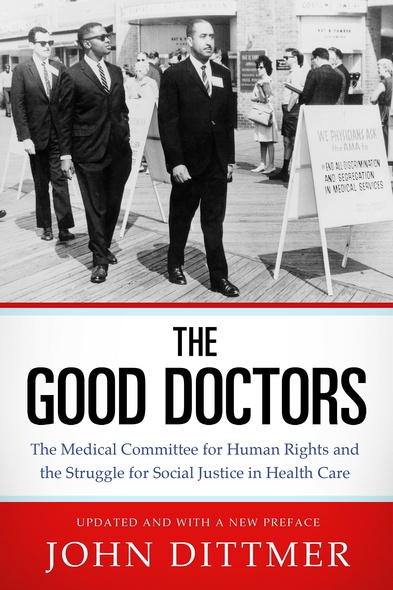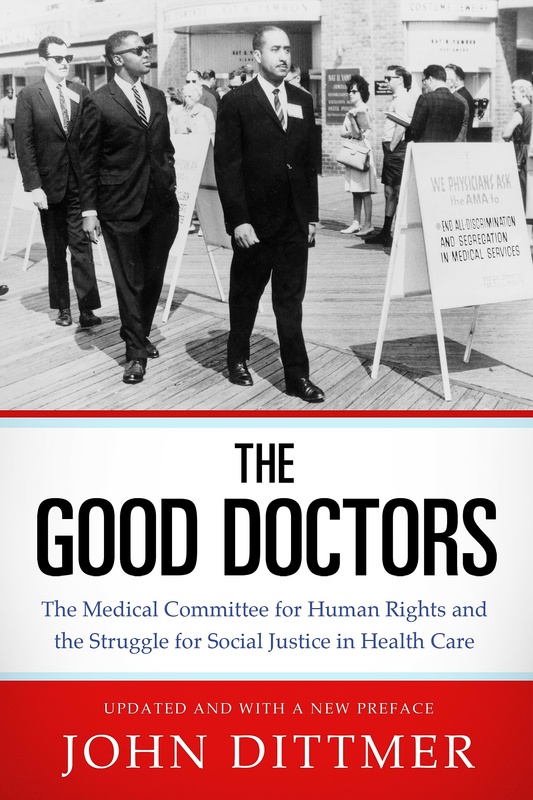
The Good Doctors
The Medical Committee for Human Rights and the Struggle for Social Justice in Health Care
In the summer of 1964 medical professionals, mostly white and northern, organized the Medical Committee for Human Rights (MCHR) to provide care and support for civil rights activists organizing black voters in Mississippi. They left their lives and lucrative private practices to march beside and tend the wounds of demonstrators from Freedom Summer, the March on Selma, and the Chicago Democratic Convention of 1968. Galvanized and sometimes radicalized by their firsthand view of disenfranchised communities, the MCHR soon expanded its mission to encompass a range of causes from poverty to the war in Vietnam. They later took on the whole of the United States healthcare system. MCHR doctors soon realized fighting segregation would mean not just caring for white volunteers, but also exposing and correcting shocking inequalities in segregated health care. They pioneered community health plans and brought medical care to underserved or unserved areas.
Though education was the most famous battleground for integration, the appalling injustice of segregated health care levelled equally devastating consequences. Award-winning historian John Dittmer, author of the classic civil rights history Local People: The Struggle for Civil Rights in Mississippi, has written an insightful and moving account of a group of idealists who put their careers in the service of the motto “Health Care Is a Human Right.”
Civil rights historian Dittmer focuses on one of the lesser-known groups involved in the struggle. . . . Dittmer reveals the motivations of many of the organization’s leaders, and he paints a disturbing picture of the shameful treatment of both black doctors and patients in the South. In the early chapters, he writes vividly of the challenges facing civil rights workers and of the brutality—beatings, jailings, killings—inflicted on them. . . . A stark reminder not just of the actions of a group of idealistic activists but of the violence and turmoil of the nation’s not-so-distant past.
The Good Doctors provides an engaging and well-written account of how the medical community became involved in the civil rights movement, not as spectators but on the front lines—in some cases risking their lives to fight against social and political injustice.
A significant contribution to historical analysis of the 1960s . . . [that’s] particularly timely today. Dittmer’s satisfying work delivers both historical detail and contextual nuance in an illuminating discussion that fills in a previous gap in the scholarly literature.
This book is an historical landmark. Dittmer’s chronicle of civil rights health care workers is captivating. All of us need to appreciate these brave pioneers.
The good doctors of John Dittmer’s history of the Medical Committee for Human Rights labored at the crossroads of American medicine and American racism. Forty years later the nation chose for its President a Black man committed to universal health care, an incredible valedictory to the risky and humanistic work of the MCHR. The Good Doctors relates the beginning of that American journey, the story of health workers confronting a system hardwired to deliver second-class medicine to people of color. The Good Doctors is an important, dramatic, and timely contribution to our understanding of racism in medicine and health equity in America.
Those who think themselves familiar with the civil rights movement in the United States are in for a welcome surprise. The Good Doctors by prize-winning historian John Dittmer tells the heroic, and previously overlooked, story of an organization that stood at the barricades in every civil rights struggle from Selma to Chicago to Wounded Knee, battling inequality and racism in the medical profession while setting up clinics that today reach hundreds of thousands of underserved patients. The Good Doctors should be required reading for every American who views quality health care as a basic human right.
In this era of racial healing, The Good Doctors is a shocking reminder of how recently Jim Crow reigned over medical care in America. Well into the 1960s, many hospitals and doctors’ offices remained segregated, with blacks given separate and grossly unequal access to beds, waiting rooms, and other basic services. Dittmer tells the tale of the courageous few in the medical profession who fought racial injustice and went on to many other battles in the 1960s and early 1970s. Freedom Summer, Selma, the anti-war movement, Alcatraz, Wounded Knee—they’re all here, in this tour of a turbulent and inspiring time that speaks forcefully to our own.
Deeply researched, brilliantly conceived, beautifully written and unsparing in its analysis of every character who walks across its pages, The Good Doctors is a triumph of passionate scholarship and balanced judgment.
The Good Doctors describes a unique historical event in our ongoing struggles for civil rights and social justice: how hundreds of doctors, nurses, medical students, psychologists and other health professionals came to join Mississippi’s ‘Freedom Summer' in 1964 and served as a volunteer medical corps for the civil rights movement. They went on to help launch a nationwide community health center network for the poor and underserved.
John Dittmer (1939–2024) was author of Black Georgia in the Progressive Era, 1900–1920 and Local People: The Struggle for Civil Rights in Mississippi, which was awarded the Bancroft Prize. He taught in the history departments at Tougaloo College, Brown University, the Massachusetts Institute of Technology, and DePauw University, where he was professor emeritus.





